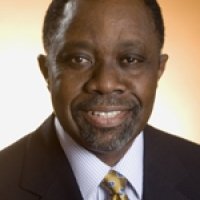Special Briefing with the Commission on HIV/AIDS and Governance in Africa
The Commission on HIV/AIDS and Governance in Africa (CHGA) convened for a two-day meeting at the Wilson Center, to finalize its report that will be submitted to the U.N. Secretary-General. Several CHGA's Commissioners, all individuals prominent in the fight against AIDS, publicly previewed some of the key elements of this two-year project, and participated in an interactive session with a Wilson Center audience of analysts and policymakers.
UN Secretary General Kofi Annan established the CHGA in 2003 under the leadership of the Executive Secretary of the UN Economic Commission for Africa, K.Y. Amoako. The Commission's brief is to advise African governments on the extent of the HIV-AIDS pandemic's impact on African social, political and economic institutions, and on appropriate policy responses.
CHGA, in collaboration with civil society organizations, clinical practitioners, research institutes, and development agencies, has driven research on the pandemic's major impacts on African governance and social and economic development. The research strategy included both focused investigations undertaken by a myriad of African and non-African research institutions, together with five regional hearings held around the African continent to engage people at all levels of society on the issue of AIDS. The CHGA represents the first instance in which the continent most affected by the HIV/AIDS pandemic has taken the lead in a an effort to assess the long-term impact of the AIDS pandemic on African government capacity and economic development; to sensitize African governments and their citizens, and their international partners, to the scale, gravity, and nature of this threat; and to mobilize political will among all African stakeholders for the policy decisions and programs required to address human resource capacity requirements, and the scaling up of effective treatment.
The Commission's report addresses the determinants, risk factors, and gradual feminization of the epidemic. The report calls for a comprehensive response including an integrated approach to prevention, treatment, and impact mitigation that is specific to the cultural context in which the response is implemented. Dr. Coll-Seck drew attention to the need for continuity between short-term emergency responses and the longer-term development efforts currently employed in African countries. She also drew attention to the need for country ownership of the problem, consolidated partnerships between national and international assistance efforts, increased gender equity awareness, sustained increases in treatment financing, and the creation of safety nets for orphans.
When asked to comment on the role of the private sector in combating AIDS, K.Y. Amoako noted that governments are currently providing the majority of funds for AIDS interventions in Africa and that private sector involvement will be one of the issues addressed in the report. He added that the budget allocations of some government still do not reflect a proper sense of priorities. Further compromising national programs, many countries are over-saturated with international funds and lack the human capital to be able to effectively procure, administer, and monitor programs. In fact, the severe impact of AIDS on Africa's human capital is perhaps one of the most distressing themes of the pending report. Consequently, creative efforts to compensate for the dearth of African technicians capable of successfully implementing international grants, and mechanisms to more actively engage the African Diaspora are being encouraged by the Commission.
The prevalence of internal displacement, cross-border migration, low levels of education, and the use of rape as a weapon of war were cited as major contributing factors to the spread of AIDS in Africa. And while external efforts to research new drugs, improve the reach of treatment, and address the structural factors contributing to the spread of AIDS, will be supported by the Commission's report, the Commissioners highlighted the imperative for individual behavioral change that is proving to be the most challenging objective.
Drafted by Georgina Petrosky.
Speakers

Founder and President, African Center for Economic Transformation, Ghana
Hosted By

Africa Program
The Africa Program works to address the most critical issues facing Africa and US-Africa relations, build mutually beneficial US-Africa relations, and enhance knowledge and understanding about Africa in the United States. The Program achieves its mission through in-depth research and analyses, public discussion, working groups, and briefings that bring together policymakers, practitioners, and subject matter experts to analyze and offer practical options for tackling key challenges in Africa and in US-Africa relations. Read more


Environmental Change and Security Program
The Environmental Change and Security Program (ECSP) explores the connections between environmental change, health, and population dynamics and their links to conflict, human insecurity, and foreign policy. Read more


Maternal Health Initiative
Housed within the Wilson Center's Environmental Change and Security Program, the Maternal Health Initiative (MHI) leads the Wilson Center’s work on maternal health, global health equity, and gender equality. Read more
